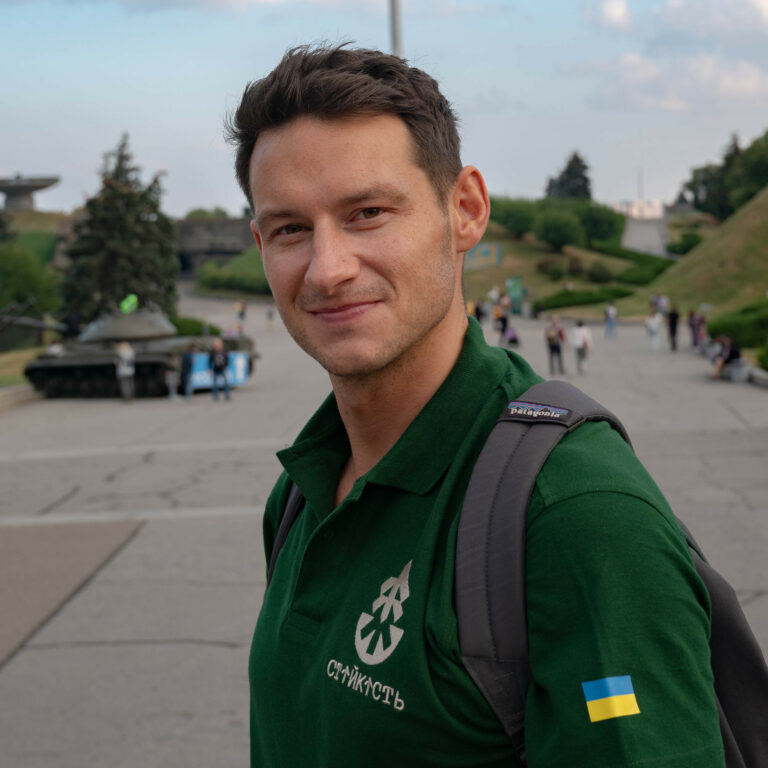
During two weeks in September 2023, lecturers from the UK were providing training to the Armed Forces of Ukraine on managing combat stress, panic attacks and anxiety on the frontline. Richard Kemp, a British Army reservist, was one of the trainers of the Project Resilience course. In this interview, he shares his experience of teaching Ukrainian soldiers about mental health, draws on real-life examples from Afghanistan on the importance of building resilience during military training, and explains why the British united in a collective outrage to help Ukraine.
– Can you tell about your military background?
I am a former regular British Army Sergeant. I served in Kosovo, Kenya, Estonia, Belize, and I was trained in the US and Germany. After completing my training, I was deployed to Afghanistan, where I was on combat operations in 2014. After this, I served in the British Army’s specialist information Warfare Teams. My civilian job is an Information and Media operations consultant.
– The full-scale invasion caught Ukrainians in different corners of the world under all possible circumstances. How and where did you hear about it?
I was with the British Army on a peacekeeping deployment to Kosovo. One day, we walked to our operations room, and the officer in command gathered us around the map table and said, “This morning, we woke up to a different world. Russia has attacked one of our allies, Ukraine.” We were shocked when it happened.
So, I was truly glad when an opportunity to contribute to the war effort happened, and I visited Kyiv in September [2023].
– What brought you to Kyiv?
This was the first time I had been to Kyiv. My former commanding Officer asked me if I could help on the Project Resilience for the Armed Forces of Ukraine. He explained that the project aims to increase combat effectiveness by reducing the short-term effects of trauma.
I’d been to a conflict zone myself, and I’d been through mental health training on the return, so the organiser thought that my experience would be useful for the course.
– Tell us about Project Resilience. How is it supposed to help the Ukrainian Armed Forces?
Project Resilience is a training programme aimed to build mental resilience for soldiers on the frontline. The first course took place in Kyiv, 15-21 September 2023.
For two weeks, six lecturers from the UK were delivering training to the Ukrainian soldiers on how to deal with combat stress, teaching skills of self-regulation, breathing and sleeping techniques.
The target audience was soldiers with no prior military experience apart from their basic training. Nearly 70 soldiers attended the course. Some of them had just come back from the frontline. Others were both soldiers and psychological officers: they had to go to the front line to talk to groups of soldiers, evaluate if they were suffering from stress or low morale. And it’s their job to do something about it and then report on it to their chain of command.
And our aim is not simply to treat the soldiers as students, but to train them to be instructors themselves, so they can go back to their units and teach others.
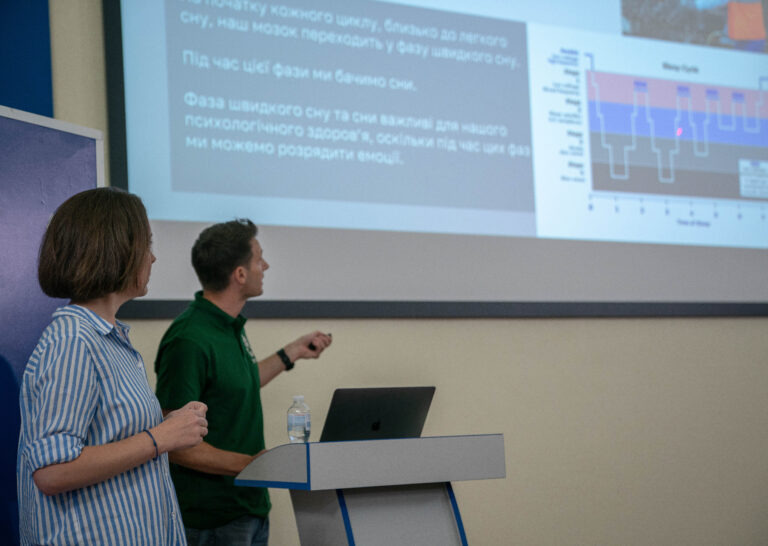
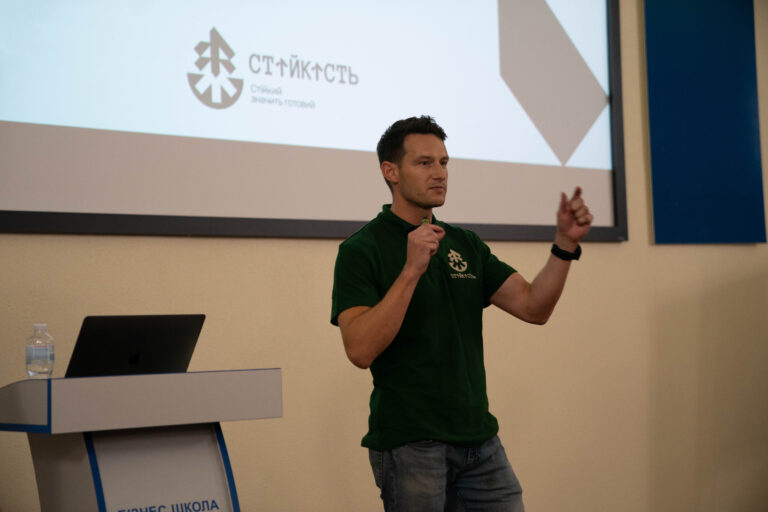
slideshow
– Why is the project called “resilience” and how does it correlate to mental health topic?
We called it a resilience course because it’s all about building mental resilience in soldiers so that when a traumatic event occurs, they know how to deal with it.
I know several great initiatives in Ukraine providing mental health support to civilians and soldiers. But, they are mostly conducted by clinical psychologists and aimed to treat post-traumatic stress disorder. We’re not about that.
We composed the course programme using a preventive model, so that soldiers can deal with traumatic events when they occur. Above all, it was focused on giving soldiers a toolbox that they might need on the front line to develop individual and group mental robustness rather than healing the result of combat psychological trauma.
It’s important to mention that Project Resilience is a course taught by soldiers for soldiers. The fact that the instructors have firsthand experience in combat greatly influences the level of trust and the quality of training.
– Does the project Resilience have any long-term aims?
Our goal is to make resilience training mandatory for Ukrainian soldiers. This training helps soldiers withstand and adapt to challenges, adversities, and shocks in combat. It is crucial for soldiers to succeed in their objectives. Without this training, soldiers will not be so effective in combat, reducing the army’s capability and manpower to address threats. And this is a matter of national survival for Ukraine now.
Additionally, we aim to improve the reintegration of current and former soldiers into society.
– What do you think about the stereotype that men keep problems to themselves? Did Ukrainian soldiers show any scepticism towards mental health issues during the course?
The army, unfortunately, is still a highly masculine environment which sometimes stigmatises talking about emotions as weakness. Both Ukraine and the UK have quite reserved populations. Talking about feelings is not common for men in these countries. But that’s changed recently in the UK army. Since the last combat troops left Afghanistan, it’s become more acceptable to talk about PTSD and mental traumas.
As for the course, it was delivered to the psychological officers, who usually work individually in their units. No one has asked them before what issues they face as trainers. This course gave them an opportunity to get into the same room, share their problems, argue, and come up with solutions. They all were very open during our lessons.
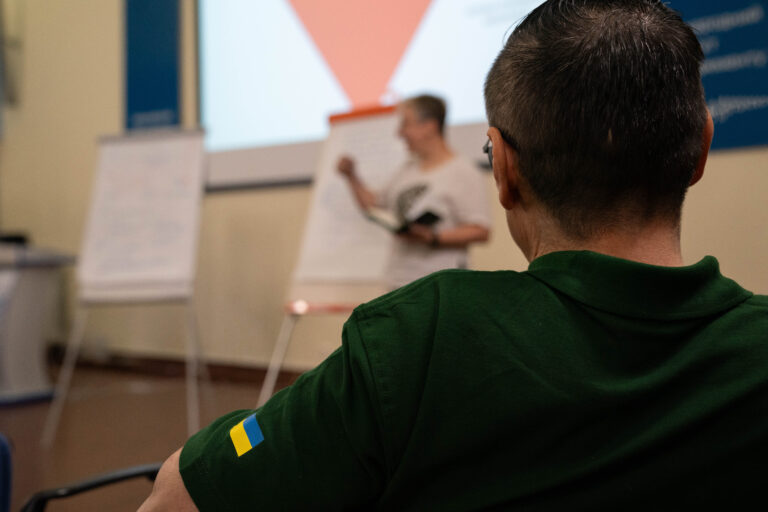
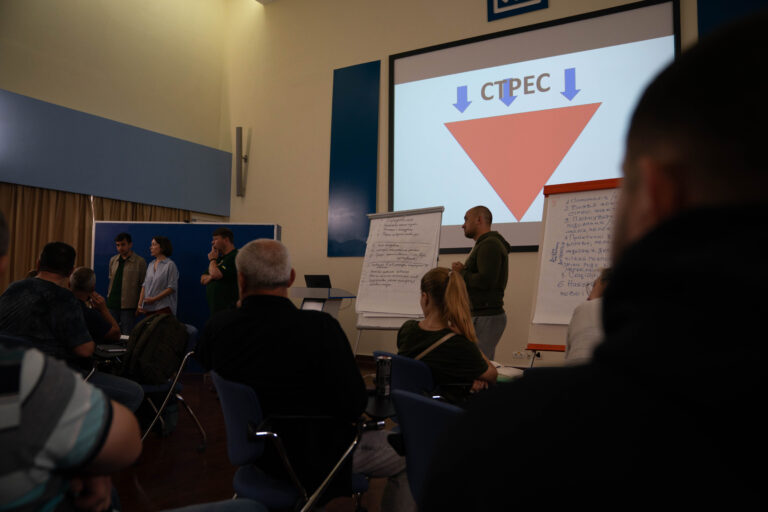
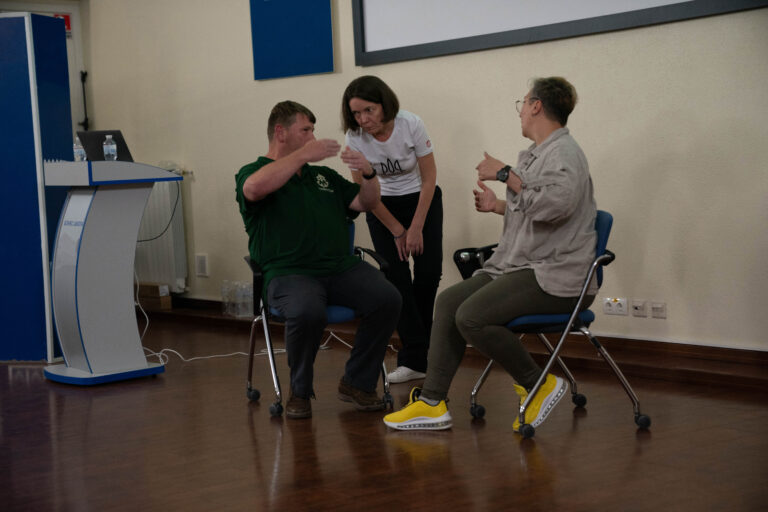
slideshow
– Tell us, from your experience, what mental challenges do soldiers face on the front line? How techniques from the Resilience course can help in those situations?
For instance, I taught lessons on iCOVER, a six-step process to treat soldiers with acute stress reactions. I’ve witnessed this reaction on the battlefield before. Back then, we didn’t know about iCOVER, so we used to shout at the soldiers in distress [during military operations], which didn’t help. They were combat ineffective, and we had to leave them in the vehicle while we were being attacked. If I had known about iCOVER, I could have treated them effectively within 60 seconds and got them back into the fight.
iCOVER
Type of trainings that incudes six-steps that soldiers can use to help restore a buddy who has been rendered combat ineffective due to an acute stress reaction (ASR) to a critical event.Also, physically, a soldier may be intact, but witnessing the injury of a comrade during a casualty evacuation can be more mentally damaging than being wounded oneself. Even an extroverted soldier can sink into a deep mental state after witnessing such events. It is the responsibility of fellow soldiers to identify this and help their comrade break free from the cycle of overthinking that leads to depression and eventually PTSD. We teach how to spot these signs early on, so soldiers can help before it gets out of hand.
Often, knowing sleep techniques can be helpful. Or if somebody is stressed at things like artillery bombardments or has headaches, then tapping techniques combined with mental imagery presentations can work. They have been proven to reduce pain. So soldiers find that very useful because they can do it anywhere.
– What strikes me about military life is that you are never alone. You eat together, fight, laugh, and suffer together. That level of intimacy, along with loyalty, camaraderie, and clear purpose, may affect combat veterans’ desire to return to war. Could you elaborate on this?
When I came back from Afghanistan, it was difficult to find meaning in my life again. During a combat operation, you are doing something so important, and the friends you make understand you much better because of what you go through in combat. Coming back to civilian life is, therefore, very difficult because you cannot experience the adrenaline of combat and the closeness of comrades that you once had.
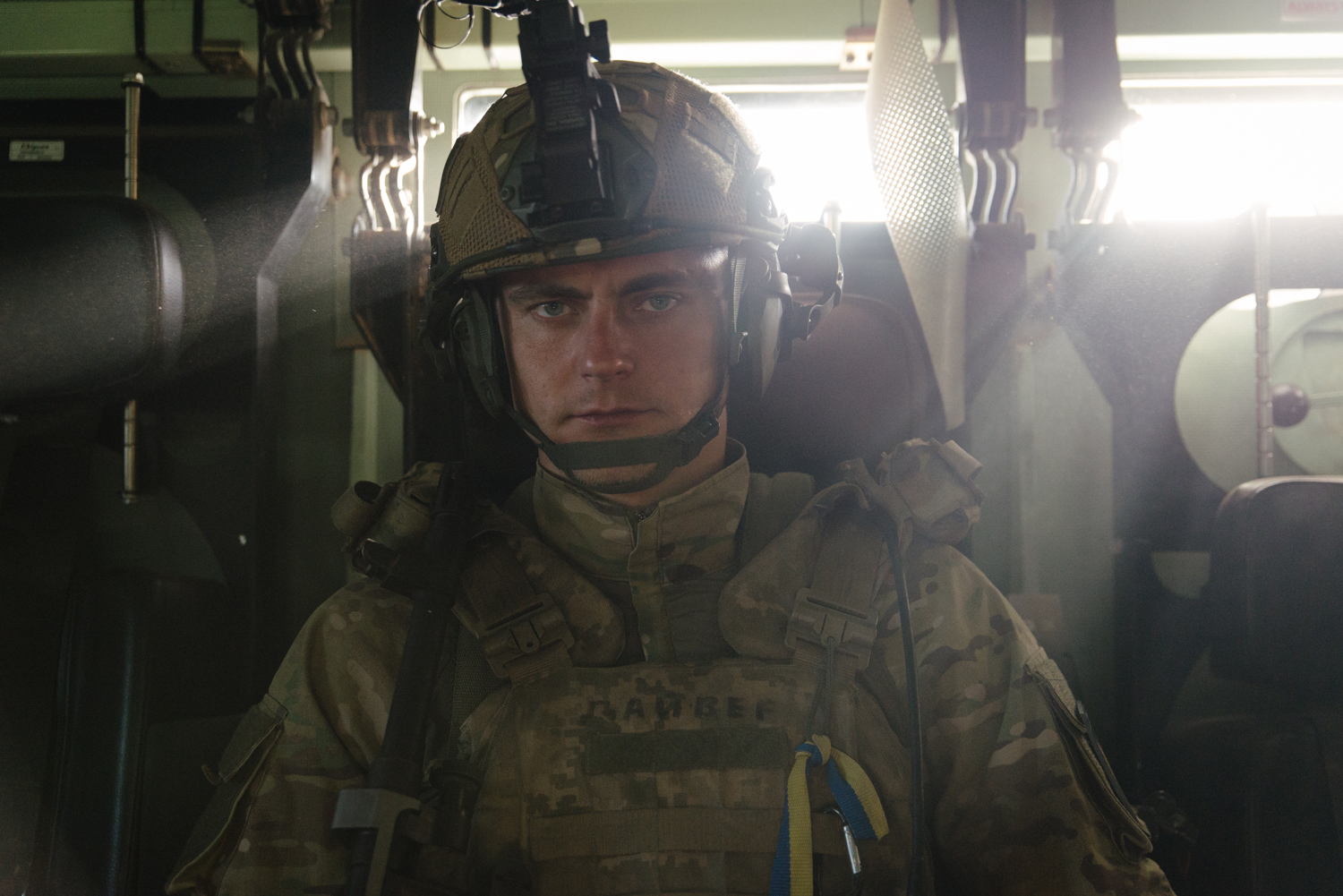
When a lot of my friends came back from Afghanistan and went into jobs in a supermarket or manual labour, and for ten years after, they’ve still got their profile picture on Facebook or WhatsApp as their image of them in Afghanistan. They told me that they’ll never do anything so eventful and purposeful ever again.
– What should civilians understand about the personal challenges which a soldier faces after he or she leaves the Army?
I think one of the things to realize is that when soldiers get back from the front line, they’re going to be angry. Even ones that aren’t suffering from really negative forms of PTSD will be irritated. They will want to get things off their chest and voice their opinions. Sometimes, you need to take it on the chin and let them shout about it because that’s also good for them.
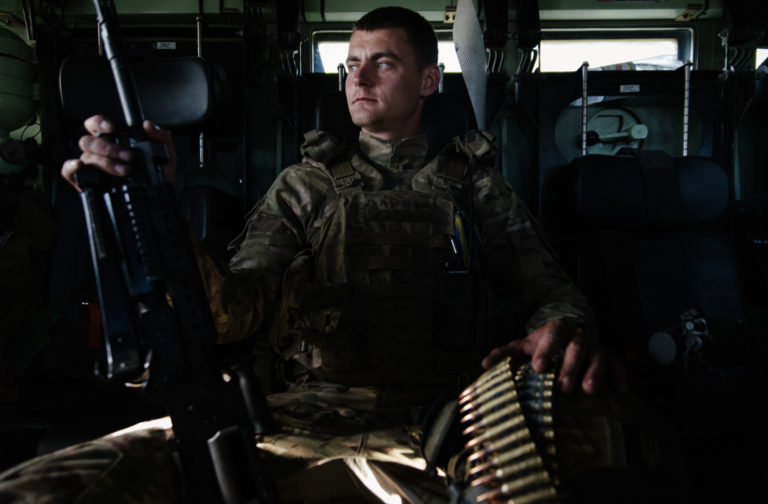
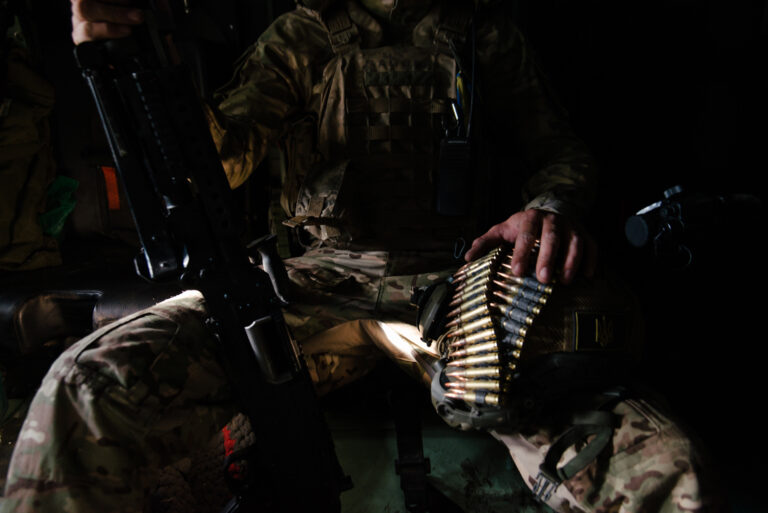
slideshow
And give it time, there’s a grieving process to go through. There’s a lot of time needed to reintegrate yourself back into society. They need to be given the opportunity to get back into a civilian job and time to get used to being in a civilian job again. It has a lot to do with time and patience.
To ask “how are you?” is a simple but effective idea. Asking a question like that is telling the soldiers that they’re not forgotten.
– Which feedback did you receive from Ukrainian soldiers about this training? How do they evaluate the role of Ukraine in that regard?
After completing the course, the feedback that we got was that any tools we can give Ukrainian soldiers to build resilience are positive. Some of the officers have civilian backgrounds as psychologists, but it isn’t enough of them.
So any training that they receive is good training at the moment because it’s so brand new and a few people are doing it right now. I think the awareness has just started, and it’s got a long way to go, but it’s good that the army is receptive to six foreigners coming from the UK to deliver training in Ukraine.
– Was it easy for you to find touchpoints and establish a connection with the audience? Do you see any similarities between British and Ukrainian people?
One of the reasons I was chosen to do the training, aside from my experience in Afghanistan, was that I’m still a serving soldier. It was much easier for me to have a connection with Ukrainian comrades, even though we’re from different countries and speak different languages.
At the end of the day, we are both soldiers. I think they found it beneficial to speak to me instead of civilian psychiatrists. They would look at them and think they don’t know what I’ve been through. Whereas I have had similar experiences and can share it with them. They were receptive to that.
There are many similarities between Ukrainian and British culture, especially having a very dark humour. It was good to have a bit of a laugh together instead of just talking to another Ukrainian person. They were talking to a foreigner, and it added a bit more interest and a bit more escapism for them.
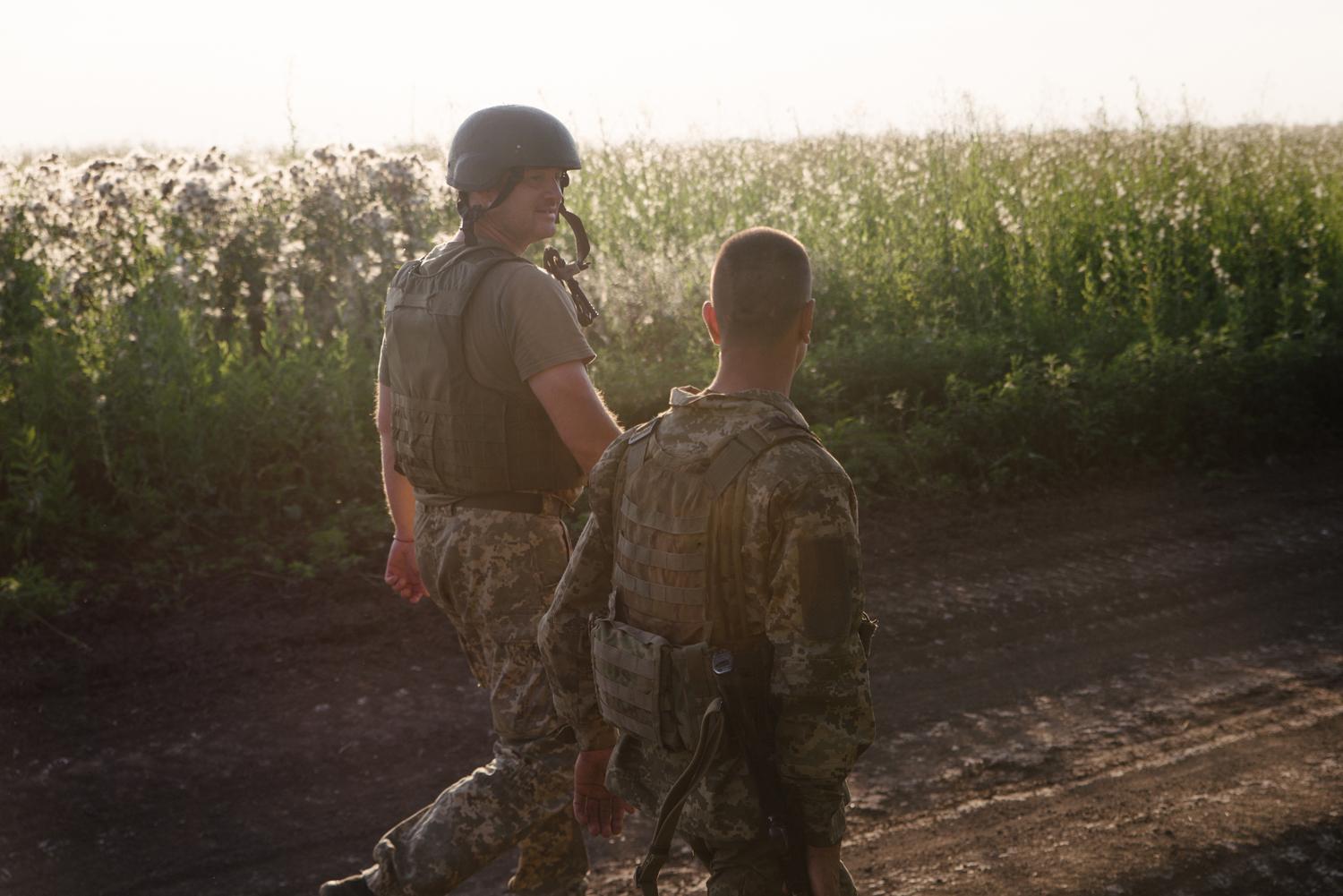
– One may have still seen loads of Ukrainian flags, even in remote villages all over the UK. Why are British people so enormously supportive of Ukraine?
It’s important to remember that the UK was technically attacked during the Skripal poisonings in Salisbury about seven years ago. Russian FSB agents murdered a Russian dissident on British soil. And Russia obviously denied it, but there was so much evidence that stacked up, and the community was outraged by this.
Another thing is that the UK is now in the middle of a political turmoil: with one side being pro-Brexit, the other side being pro-Europe, and there are many divisions within families. But when Russia attacked Ukraine, this ironically brought us together in the collective effort. And people now want to fly Ukrainian flags to show their support for their fellow Europeans.
It’s a level of support that we’ve never seen in the UK before because it’s a country that’s naturally very conservative when it comes to emigration and refugees. But now, a lot of British people want to do something that we all know is right, like helping Ukraine fight off a bully.

